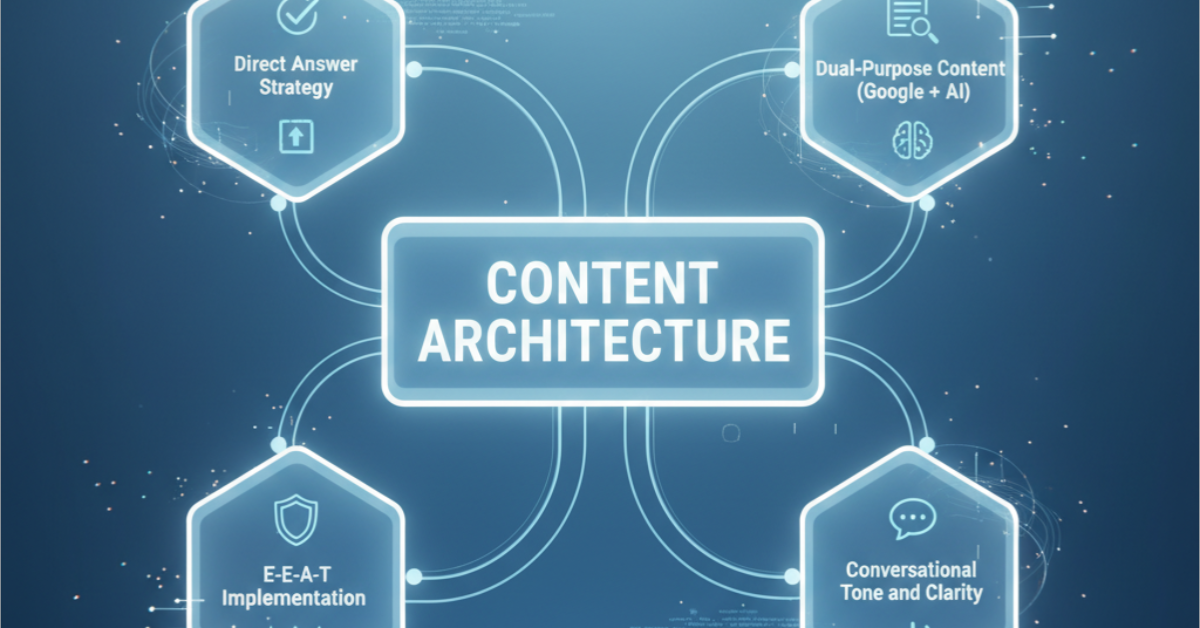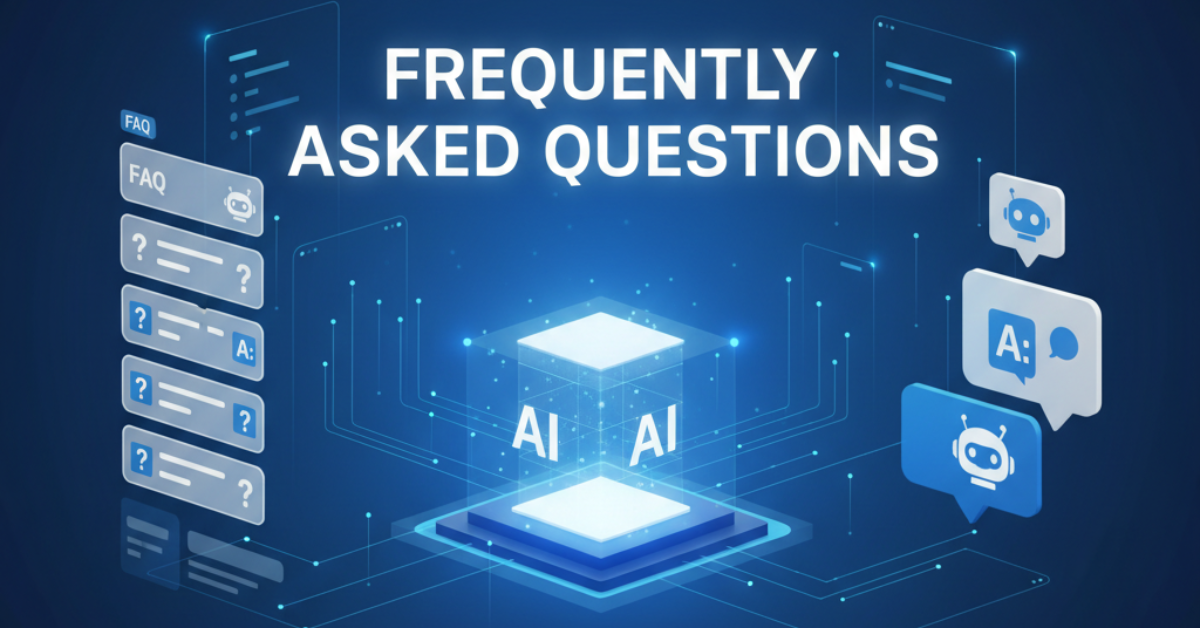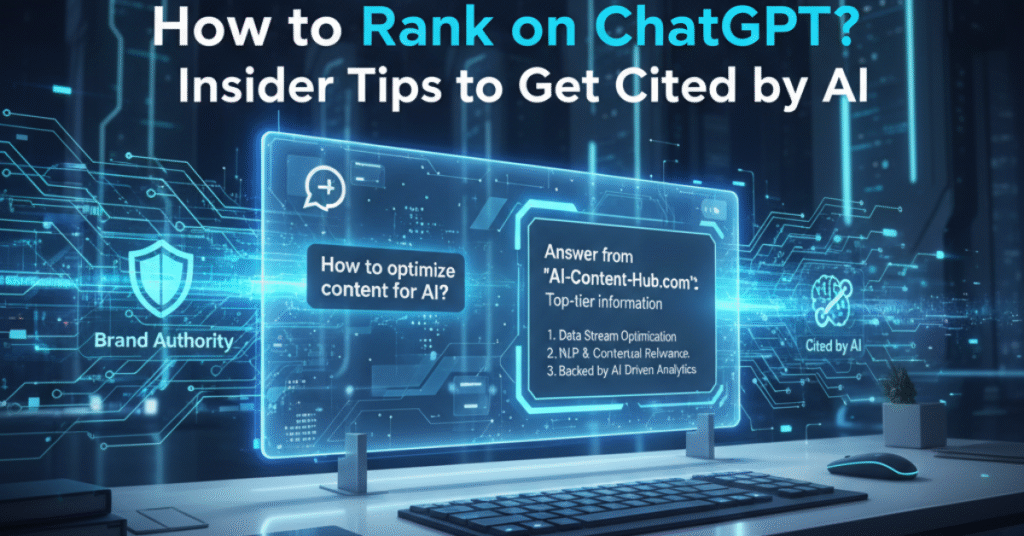The way users search for information is changing. Instead of scrolling through pages of links, people often receive a single, synthesized answer from AI models like ChatGPT. This shift means businesses need to focus on how to rank on ChatGPT to ensure their content is cited directly in AI-generated responses.
How can your website become visible on ChatGPT? By optimizing content for generative AI search engines, structuring information for crawlability, and building credible authority signals. Generative Engine Optimization (GEO), also called Answer Engine Optimization (AEO), is designed to make your content a trusted, definitive source for AI models. Unlike traditional SEO, GEO ensures content is machine-readable, highly useful, and authoritative so AI systems can extract and present it accurately.
The goal is no longer just click-through rates (CTR) but maximizing Summary Inclusion Rate (SIR)—how often your brand or content is referenced in AI responses. In this article, you will learn why traditional SEO alone is insufficient, how GEO differs from conventional strategies, how to structure content and authority signals for AI, and why maximizing SIR is now the key to visibility.
Why Ranking on ChatGPT Matters

The way people access information has shifted dramatically. Increasingly, users no longer click through multiple search results—they often get a single, AI-generated answer directly in ChatGPT or similar generative search platforms. This “zero-click reality” means businesses must rethink visibility. Simply ranking on Google is no longer enough; knowing how to appear in ChatGPT answers is critical to ensure your content is cited and trusted.
One way to measure your impact is through the AI Visibility Score, which tracks how frequently and authoritatively your brand is referenced in AI-generated answers. A higher score means your website and content are more likely to be used as a source when ChatGPT or other AI systems provide responses. Understanding how ChatGPT sources web content is vital—AI models rely on structured, authoritative, and machine-readable data to extract accurate answers.
Generative models operate in two ways: Retrieval-Augmented Generation (RAG), which pulls live data from the web, and fine-tuned static models, which rely on pre-trained datasets. RAG ensures freshness, while fine-tuned models can become outdated. The implication is clear: to get your website cited by ChatGPT, your content must be consistently updated, highly informative, and structured for AI extraction.
Key Focus Areas: Technical Gateways and External Authority

To effectively rank on ChatGPT, businesses must focus on both technical accessibility and credible authority signals. One of the primary gateways for AI models like ChatGPT is Bing search. Since ChatGPT often retrieves live web data through Bing, ranking well in Bing improves your chances of being cited. This makes technical optimization for generative AI search engines critical to ensure AI models can discover and understand your content.
Content accessibility plays a key role. Pages must be crawlable, fast-loading, and structured for machine readability. Using clear HTML, avoiding excessive JavaScript rendering, and implementing structured data are essential steps in your content strategy for ChatGPT citation. This ensures AI systems can extract precise answers quickly.
Authority signals further reinforce visibility. These include brand mentions across blogs, forums, and social media, reviews on platforms like G2, Trustpilot, or Gartner Peer, and overall domain quality. Structured data—including FAQPage, HowTo, and Organization schema—helps AI models recognize your content as trustworthy and relevant. Engaging in community content, such as Reddit discussions or Quora answers, also contributes by providing additional context and credibility.
By combining technical readiness with strong authority signals, your content becomes more likely to appear in AI-generated answers. Well-optimized, structured, and authoritative content ensures AI systems cite your website accurately, improving visibility without relying solely on traditional search traffic.
The 3-Phase GEO Playbook: Step-by-Step Optimization
Phase 1: Foundation and Crawlability

The first step in learning how to rank on ChatGPT search is ensuring your site is fully crawlable and structured for AI extraction. AI models like ChatGPT rely on accessible content to provide accurate responses, so if your pages are blocked or obscured, they will never be cited.
Explicitly Allow AI Crawlers
Purpose: Ensure AI models can crawl and extract your content without restrictions.
Action: Review your robots.txt file to confirm that key pages are not disallowed and that the default settings allow bots to access important content. Avoid blocking directories or pages that contain primary content for AI extraction.
Example: A standard robots.txt allowing all bots to crawl:
User-agent: *
Disallow: /private/
This ensures that publicly available pages, like product descriptions or guides, remain accessible to generative AI models.
Optimize for the Bing Gateway
Purpose: Bing acts as a primary search source for generative AI; ranking in Bing boosts your chances of being cited.
Action: Submit your site via Bing Webmaster Tools and ensure that essential content, like pricing tables or product descriptions, avoids heavy JavaScript rendering. Fully HTML-rendered content improves AI extraction and citation accuracy.
Example: A product page with HTML-based feature tables is more likely to appear in AI answers.
Local Authority Outreach
Purpose: Increase your likelihood of being referenced by AI through trusted local sources.
Action: Identify top local blogs or curated lists (“Top 10 hotels in New York”) and request inclusion or backlinks. These authoritative mentions strengthen brand credibility for AI models.
Example: A boutique hotel listed in a popular local travel guide gains both human and AI visibility.
Implement Targeted Schema Markup
Purpose: Help AI models understand the content type and context of each page.
Action: Apply page-specific schema such as FAQPage for FAQs, HowTo for instructional content, and Organization or LocalBusiness for homepage and brand info. Avoid applying the same schema site-wide, which can confuse AI extraction.
Example: A service page with FAQ schema answering user questions directly increases the likelihood of appearing in AI-generated answers.
Deploy Machine-Readable Fact File
Purpose: Provide AI with verified, structured data for extraction and citation.
Action: Host a facts.json file containing key information such as pricing, features, awards, and certifications.
Example: A hotel site includes a table of room types, amenities, and certifications in facts.json, enabling AI to reference accurate details in responses.
By laying this foundation, your content becomes fully visible, credible, and extractable, establishing the first critical phase in learning how to rank a brand on ChatGPT effectively.
Phase 2: Content Architecture

Direct Answer Strategy
Purpose: Help AI models quickly find and extract relevant information from your pages.
Action: Place concise, definitive answers at the very top of each page. This ensures that when generative AI systems process your content, the key points are immediately visible and extractable.
Example: On a hotel page, the first paragraph should answer “What are the top amenities of The Ray Hotel?” rather than burying details deep in the text.
Dual-Purpose Content (Google + AI)
Purpose: Create content that serves both human users and AI, maximizing visibility and engagement.
Action: Use clear headings, bullet points, structured tables, and detailed guides. Provide information in multiple formats — textual descriptions, tables, and lists — to make extraction easier for AI while remaining readable for humans.
Example: A restaurant menu page includes ingredients, allergy information, and preparation instructions in both table and paragraph formats.
E-E-A-T Implementation
Purpose: Establish credibility, authority, and trust with both AI and users.
Action: Highlight author credentials, certifications, awards, case studies, and third-party citations. AI models increasingly factor source trustworthiness when referencing content.
Example: An “About the author” section detailing verified culinary awards and professional experience.
Conversational Tone and Clarity
Purpose: Make content easy to read, understand, and extract for AI systems.
Action: Use natural phrasing, structured Q&A, and bullet lists rather than dense blocks of text. Answer potential questions directly within the content.
Example: FAQ section answering “Is this hotel pet-friendly?” clearly and concisely.
Prioritize Utility Over Promotion
Purpose: Increase content value for users and AI by providing actionable insights rather than purely promotional text.
Action: Incorporate comparison tables, step-by-step guides, or data-driven insights. This encourages AI to cite your content as a reference rather than skip it.
Example: Hotel page comparing room types, amenities, and nearby attractions.
Signal Temporal Relevance
Purpose: Ensure content reflects the latest information so AI and users trust it.
Action: Display “Last Updated” dates prominently, review top-performing pages monthly, and update seasonal offers, pricing, or other time-sensitive details.
Internal Linking & Content Clusters
Purpose: Strengthen thematic authority and help AI models understand topic relationships.
Action: Build pillar pages linking to related cluster content, keeping structure logical and navigable.
Example: An “Ultimate Travel Guide” page linking to hotel, dining, and local attraction pages enhances both user navigation and AI extraction.
Phase 3: Authority Acceleration

High-Authority Mentions & Local Outreach
Purpose: Reinforce AI trust by appearing on credible sources and increasing your brand’s likelihood of being cited. AI models prioritize sources with strong domain credibility and relevance.
Action: Secure backlinks from authoritative blogs, local directories, niche publications, and industry lists. Focus on sources relevant to your business or location for contextual authority.
Example: A boutique hotel gets featured in curated lists such as “Top 10 Hotels in Miami” or local travel blogs, signaling trustworthiness to AI.
Third-Party Validation Platforms
Purpose: Provide verified trust signals for AI and human users alike. Structured, trustworthy data helps AI determine which content is credible.
Action: Maintain accurate profiles and actively manage reviews on platforms like G2, Trustpilot, Tripadvisor, and Yelp. Implement Review schema to make user-generated feedback machine-readable.
Example: A verified customer review with structured data displays on a hotel page, improving both AI visibility and user trust.
Community Citadel Strategy
Purpose: Build contextual authority and signals of expertise through active engagement in relevant communities.
Action: Participate in forums such as Reddit, Quora, or niche industry communities. Offer detailed, helpful answers and link to your authoritative content naturally.
Example: Responding to travel-related questions on Reddit with structured, informative answers that reference your hotel blog, increasing both user trust and AI citation probability.
Respond to User-Generated Content
Purpose: Increase brand activity signals and trust, which AI models may factor into citation likelihood.
Action: Actively respond to all client reviews across platforms, addressing positive feedback and resolving negative comments professionally.
Example: A hotel replies to GMB and Tripadvisor reviews thanking guests, clarifying services, and providing solutions, reinforcing reliability.
Structured, Informative Content for AI Extraction
Purpose: Ensure AI can accurately extract facts from your content, improving your chances of appearing in answers.
Action: Use page-specific schema (FAQPage, HowTo, Organization), tables, step-by-step guides, and clear, user-friendly layouts. Avoid generic site-wide schema in favor of page-level precision.
Example: A travel page includes a table detailing room types, amenities, check-in/out times, and a HowTo guide for bookings, making content easy to extract and cite by AI.
Advanced Strategies & Optimization Tips

Once the foundational SEO and authority signals are in place, advanced strategies can significantly enhance your visibility and increase the likelihood of being cited by ChatGPT.
Internal Cross-Linking: Strategically link related pages within your site to strengthen topical authority and help AI models understand content relationships. For example, a hotel’s “Dining” page can link to its “Local Attractions” and “Events” pages, creating a cohesive cluster that reinforces your brand expertise.
High-Authority Guest Posts: Contributing guest posts to credible blogs, industry publications, and local news sites boosts your citation probability. Backlinks from authoritative sources signal trust to both search engines and AI models, increasing the chances your website is referenced in answers.
Monitor Trending AI Prompts: Stay updated with trending questions or prompts in ChatGPT and Bing. Adjust your content to align with current search patterns and user intent. This ensures your pages are relevant, timely, and more likely to be extracted for AI responses.
Structured Content Optimization: Use tables, FAQ sections, and HowTo guides to make content machine-readable while providing utility to users. Structured content helps AI extract concise, accurate answers efficiently.
Common Mistakes to Avoid
When optimizing for ChatGPT and other generative AI search engines, certain missteps can significantly reduce visibility and credibility.
Hidden or AI-Targeted-Only Content: Creating content solely for AI extraction without user value can backfire. Focus on content that is readable, useful, and contextually relevant for both users and AI.
Ignoring Structured Data or Answer Blocks: Failing to implement page-specific schema, FAQ, or HowTo structured data limits AI’s ability to extract accurate information. Proper structured content improves both AI citations and Google snippet eligibility.
Prioritizing Design Over Function: Focusing too much on flashy design while neglecting usability and crawlability can harm your site. Complex layouts, heavy scripts, or hidden content may confuse AI and frustrate users, reducing both engagement and rankings.
Relying on Repetition Without Credibility: Repeating keywords or information without verified, authoritative sources undermines trust. AI models prioritize content supported by expertise, experience, and authority (E-E-A-T).
Failing to Update Content: Even authoritative pages can become obsolete if not refreshed. Regularly update statistics, features, pricing, and guides to maintain relevance.
Check Your Site’s GEO Health

Before implementing any GEO strategies, it’s essential to assess your site’s current health. Understanding strengths, weaknesses, and visibility gaps ensures your efforts to rank on ChatGPT are focused and effective.
Start by auditing your site’s crawlability, backlinks, and keyword presence in Bing and AI-indexed pages using tools like Semrush or Ahrefs. These platforms can highlight broken links, missing meta data, and pages not optimized for AI extraction.
Next, measure how frequently your brand is cited in generative answers with AI visibility tools such as BrightEdge Copilot, NeuronWriter, or direct ChatGPT/Bing queries. This provides a real-time snapshot of your GPT ranking and AI authority.
Evaluate structured data coverage carefully. Ensure that each page has the appropriate schema (FAQPage, HowTo, LocalBusiness) and fix broken or missing markup. Proper schema implementation improves AI extraction and increases the chance your content appears in ChatGPT responses.
For example, a hotel used Semrush to identify broken schema on booking pages, updated the markup, and observed a noticeable increase in mentions and citations in AI-generated answers.
By regularly checking your site’s GEO health, you can optimize your content strategy, improve AI ranking ChatGPT, and maintain visibility in generative search engines.
Conclusion: Future of Authority in Generative AI
The digital landscape is rapidly evolving from traditional SEO to Generative Engine Optimization (GEO). Where conventional strategies focused on ranking for keywords and maximizing click-through rates, GEO emphasizes appearing directly in AI-generated answers, ensuring your content is cited by models like ChatGPT. Understanding how to rank on ChatGPT has become essential for businesses aiming to capture AI-driven search traffic and maintain visibility in a zero-click environment.
Success in this new paradigm rests on four critical pillars: crawlability, ensuring AI can access and parse your content; structured, high-utility content, designed to answer user questions directly; authority signals, built through backlinks, community engagement, and third-party validation; and temporal relevance, keeping content fresh and accurate. Together, these elements increase the likelihood that your website will be recommended or referenced in generative AI responses, improving your GPT ranking and AI ranking ChatGPT.
To operationalize these strategies, businesses should track the AI Visibility Score as a primary KPI. This metric measures how often your content is cited in generative answers, guiding continuous improvements to content, schema, and authority signals. By adopting GEO best practices, brands not only stay ahead in AI-driven search but also enhance trust, user engagement, and overall online authority.
Frequently Asked Questions

How to rank on ChatGPT?
Ranking on ChatGPT requires a focus on Generative Engine Optimization (GEO). This means creating content that is crawlable, structured, and authoritative so AI can extract accurate answers. Regularly updating pages and using schema markup increases your chances of being cited. Monitoring AI visibility tools helps track how often your content appears in AI-generated answers..
How to SEO for ChatGPT?
SEO for ChatGPT differs from traditional SEO—it’s about making content machine-readable, authoritative, and highly useful. Focus on clear answers at the top of pages, structured data for easy extraction, and maintaining credibility through author credentials, reviews, and citations. Fresh, up-to-date content maximizes AI inclusion.
How do I index my website on ChatGPT?
Your website becomes indexable by AI models by being accessible through primary retrieval sources like Bing. Ensure pages are crawlable, fast-loading, and properly structured. Using FAQ, HowTo, or organization schema helps AI extract information accurately, increasing the likelihood your site appears in ChatGPT’s answers.
Does structured data affect AI ranking?
Yes, structured data plays a crucial role in AI ranking. Schema markup like FAQPage, HowTo, and Organization helps AI models extract content accurately and display it in generative responses. Properly structured data increases the likelihood that your website will be cited, enhancing your GPT ranking and visibility in ChatGPT answers.
Why is Bing optimization critical?
Bing often serves as a primary retrieval source for ChatGPT and other AI search engines. Ensuring your site is properly indexed, crawlable, and optimized in Bing Webmaster Tools improves the chances that your content will be available for AI extraction. High Bing visibility directly influences how frequently AI models get your website cited by ChatGPT.
Can community engagement improve AI ranking?
Absolutely. Engaging in forums like Reddit, Quora, and niche communities increases your brand mentions and contextual authority. Active participation, answering questions, and linking to authoritative content signals credibility to AI models. This type of engagement helps your content appear in ChatGPT answers and improves your overall AI visibility.

